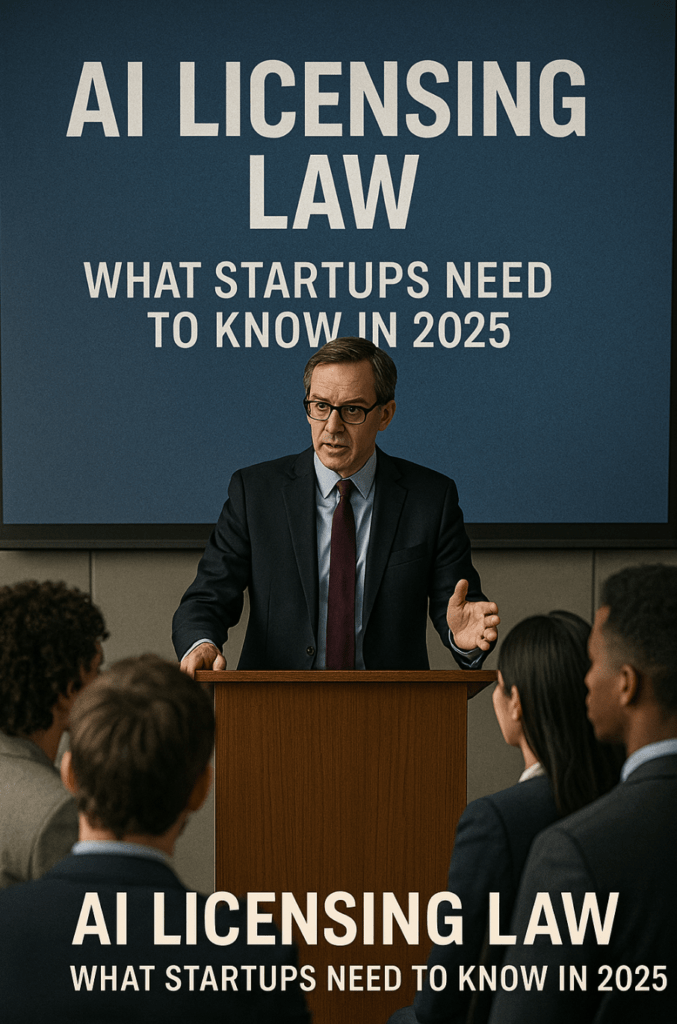| The rise of generative AI tools, machine learning APIs, and autonomous software agents has transformed how startups innovate. But as companies race to integrate these tools into products, platforms, and workflows, few are pausing to ask: Do we actually have the rights to use this AI the way we plan to?
That question lies at the heart of AI licensing law, an emerging legal landscape that governs how artificial intelligence models, training data, outputs, and integrations are owned, licensed, and litigated.Whether you’re building your own model, fine-tuning open-source tools, or integrating commercial APIs like OpenAI, Cohere, or Stability AI, understanding your rights and responsibilities under AI licensing law is critical. Let’s break down what startup founders and legal teams must consider. Understanding the Basics of AI Licensing LawAI licensing law combines traditional intellectual property doctrines (copyright, trade secrets, patents) with the rapidly evolving licensing models for data, code, and model outputs. Licenses may govern:
Most of these components may be governed by overlapping or novel licenses. For example:
Knowing what licenses apply — and what you can and can’t do — is step one. Why AI Licensing Law Matters for StartupsMany startups overlook licensing risks in the early stages of development. But here’s why that’s dangerous:
Understanding AI licensing law from the outset can:
Key Types of AI Licenses Startups Encounter1. Open Source Licenses for AI ModelsOpen-source LLMs like Meta’s LLaMA or Hugging Face’s BLOOM offer startups powerful tools — but licenses vary.
Always read the fine print. Licensing terms affect your ability to monetize or scale. 2. Commercial API AgreementsPopular AI APIs (like OpenAI’s GPT-4 or Google Cloud’s Vertex AI) are governed by Terms of Use or commercial MSAs.
3. Data LicensingTraining an AI model often means ingesting millions of data points. But is your training data:
Unlicensed training data can expose startups to claims of copyright infringement, violation of privacy rights, or breach of data agreements. 4. Output Usage RightsThe law is still evolving around who owns AI-generated content. But many licenses are beginning to clarify:
These terms vary significantly between models and platforms. Red Flags in AI Licensing AgreementsHere are clauses to watch for in any AI license or terms of use:
These red flags can turn into deal-killers during funding or acquisition. How to Protect Your Startup Under AI Licensing LawGet Legal Review EarlyEngage an attorney who understands AI licensing law to review any:
Document Your StackCreate a clear inventory of:
This makes you diligence-ready and defensible. Negotiate When PossibleIf you’re paying for an API or dataset, negotiate better terms:
|
L.A. TECH & MEDIA LAW FIRM – Intellectual Property & Technology Attorneys


David N. Sharifi, Esq.
David N. Sharifi, Esq. is a Los Angeles based intellectual property attorney and technology startup consultant with focuses in entertainment law, emerging technologies, trademark protection, and “the internet of things”. David was recognized as one of the Top 30 Most Influential Attorneys in Digital Media and E-Commerce Law by the Los Angeles Business Journal.
Office: Ph: 310-751-0181; david@latml.com.
Disclaimer: The content above is a discussion of legal issues and general information; it does not constitute legal advice and should not be used as such without seeking professional legal counsel. Reading the content above does not create an attorney-client relationship. All trademarks are the property of L.A. Tech & Media Law Firm or their respective owners. Copyright 2024. All rights reserved.
Recent Posts
TOPICS
L.A. TECH & MEDIA LAW FIRM
12121 Wilshire Boulevard, Suite 810, Los Angeles, CA 90025.
Office: 310-751-0181
Fax: 310-882-6518
Email: info@latml.com

